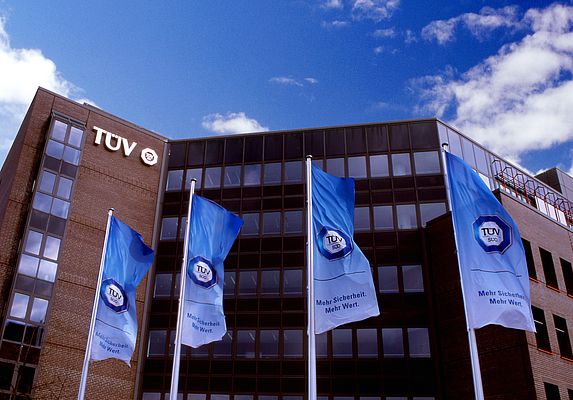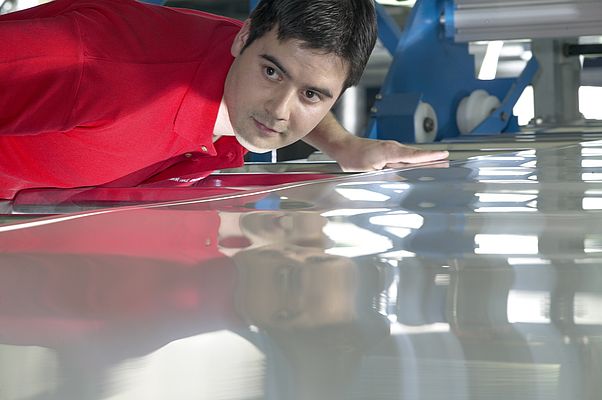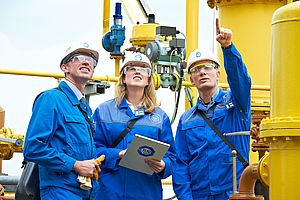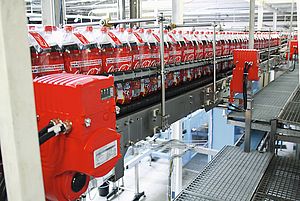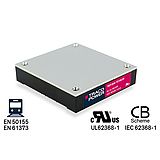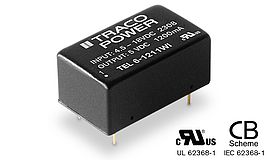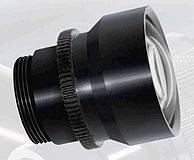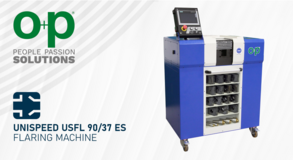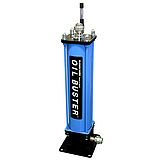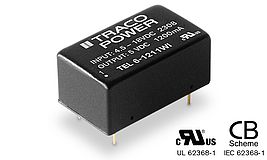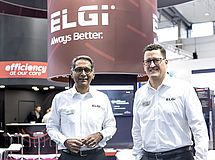Saving taxes, cutting costs and protecting the environment – SIMONA AG, located in the German region of Rhineland-Palatinate, is considered a trailblazer in energy efficiency in the plastics industry. Supported by TÜV SÜD Management Service, SIMONA AG was one of the first companies in the industry to introduce an energy management system in accordance with the ISO 50001 standard, and now continues to work on improving its energy performance.
The company has set itself the target of reducing its energy consumption by 1.5 per cent per year. After all, energy costs account for a significant part of total costs in all companies in the plastics sector, and SIMONA AG is no exception. The extruders and presses used in the processing of plastic granules and the injection moulding machines consume not only electricity, but also gas, steam and compressed air. The logistic processes in the company's high-bay warehouse also use energy, i.e. fuel for forklifts and electricity for packaging and conveying systems. In energy-intensive companies in particular, energy costs have a direct impact on competitiveness.
Significant cost cuts are only possible if companies take a proactive approach and make far-reaching decisions. SIMONA AG, for example, had already started to establish an energy management system before the introduction of the EN ISO 50001 standard. From the outset, the company applied the iterative Plan-Do-Check-Act (PDCA) process to identify and implement specific measures. As soon as SIMONA AG reaches a target, this target is established as a standard and becomes the baseline in the next improvement cycle. In addition, TÜV SÜD Management Service acts as a partner for SIMONA AG that offers support and knowledge services at every step of the process, issued the ISO 50001 certificate after several audits and will continue to monitor the company's progress in the field of energy efficiency in the future.
Specific measures
Transparent documentation of all energy flows is one of the main elements of an energy management system in accordance with the ISO 50001 standard – the more detailed the information of when and where how much energy is consumed, the more easily suitable opportunities for improvement can be identified. SIMONA therefore significantly increased the number of sensors in its production halls, and now accurately and systematically records, documents and centrally evaluates the use of electricity, gas, steam, compressed air and fuel at all its production sites and its logistics centre. The installation of further measurement sensors is in the planning stage.
Both recording and evaluation are carried out with the help of a new software product. The figures obtained enable a direct comparison of consumption and production indicators and thus the drawing of conclusions about opportunities for energy saving. At the same time, the data indicate irregularities in consumption and thus help the company to identify defects far earlier than in the past. To keep energy consumption as stable as possible and prevent peak loads from driving up costs, SIMONA AG also installed a customised power management control system.
Last but not least, the collected data also provide arguments in favour of replacing machines and components with more energy-efficient models that are not only selected under the aspect of energy efficiency but also dimensioned and integrated to meet the company's individual requirements.
Management responsibility
Another core requirement of the ISO 50001 standard is to strengthen the importance of energy management in the company. For example, the standard focuses far more closely than its predecessor on the overall responsibility of top management and demands the appointment of internal energy management representatives. SIMONA AG delegated the core responsibility for energy management to energy managers that can access all relevant data and act as liaisons between management and personnel. The involvement of employees in energy management is another key factor of success, as they are the ones that are most familiar with the processes, machines and products, can make detailed suggestions and will implement the objectives and changes on site in operations at a later stage.
Energy management as a way of life
Energy management needs continuity. In line with the PDCA cycle, SIMONA will continue to challenge the objectives it reaches on an ongoing basis and align them with progress in the state of the art, aware that every improvement will become the standard as time passes and can be further improved as technology proceeds. This fact is also firmly anchored in the ISO 50001 standard – to document changes at an ongoing basis, the standard requires annual surveillance audits that identify further opportunities for improvement. At SIMONA AG, TÜV SÜD will verify at regular intervals that the company is continuing to work on improving its energy performance. After a period of three years, the standard requires re-certification against the standards of optimum energy efficiency applicable at that time.
Saving taxes with the EN ISO 50001 standard
To improve international competitiveness, the German government introduced an energy-tax cap under which companies in energy-intensive industries in Germany can save a significant part of their energy tax. To apply for the energy-tax cap, companies must provide evidence of a certified energy management system in accordance with ISO 50001. Companies are granted a two-year period of transition for certification. In addition, companies have to continuously improve their energy efficiency – by 1.3 per cent per year between 2013 and 2015. As an alternative to an energy management system in accordance with ISO 50001, companies wishing to apply for an energy-tax cap can also introduce an environmental management system in accordance with EMAS.
SIMONA AG
SIMONA AG, with headquarters in Kirn, Rhineland Palatinate, Germany, is a leading supplier of thermoplastics. The company employs a team of over 1,200 employees at its multinational production and distribution sites. SIMONA AG focuses on the production of extruded semi-finished thermoplastic parts, such as pipes and fittings, and finished products for use in industrial applications, e.g. the construction of process engineering equipment and installations for the chemical industry and various sectors including the automotive, mechanical engineering, life science, construction and advertising industries. The product range comprises over 35,000 items such as sheets, rods, profiles and welding rods.
The authors:
Volker Wöhl, Customer Competence Centre, TÜV SÜD Management Service GmbH, Lead Auditor ISO/TS 16949, EN ISO 50001, EN ISO 9001, VDA 6.3
Klaus Gerspacher, Energy Management Representative, SIMONA AG
Eric Schönel, Head of Marketing & Communication, SIMONA AG


